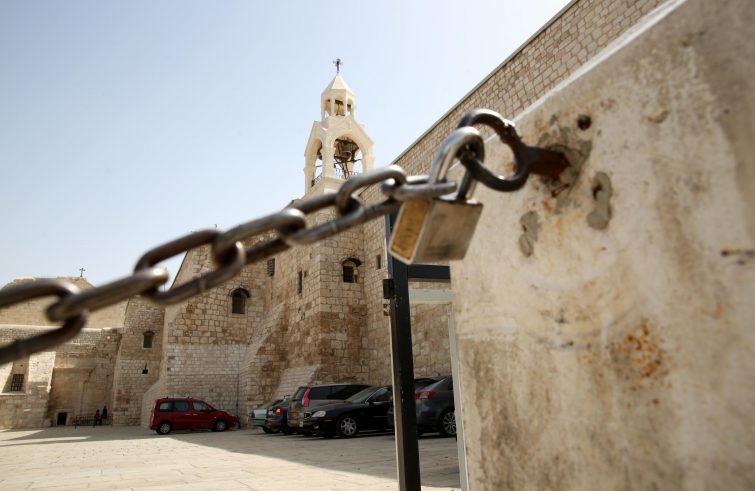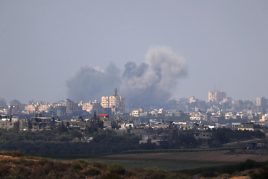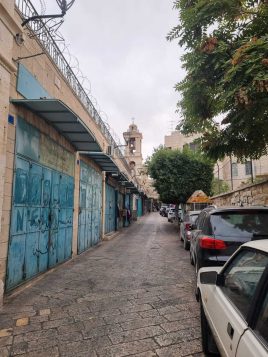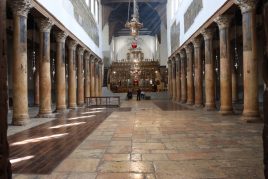
“The situation in Bethlehem is becoming more critical and tense by the day. The city has been ‘sealed off’, no Palestinian can enter or leave the town, because Israel has imposed a closure by placing concrete blocks on every passageway. Only one checkpoint is open, but only for foreign citizens. We are practically living under siege. Sister Fayeza Ayad, a member of the community of the Franciscan Minimal Sisters of the Sacred Heart who has been living in Bethlehem for more than 20 years, knows what it means to live under siege because, as she told SIR, “I was inside the Church of the Nativity when, on April 2, 2002, more than 240 armed Palestinian militiamen (belonging to the Al-Aqsa Brigades, Islamic Jihad and Hamas, Ed.’s note) stormed the church to avoid being captured by the Israeli army (IDF).” At the height of the Second Intifada (2000-2005), the largest cities in the West Bank, Ramallah, Jenin, Tulkarem, Qalqilya, Nablus and Bethlehem, were invaded by the Israeli troops. The Israeli Defence Forces launched Operation Defensive Shield on March 29, 2002 in response to the Palestinian terrorist attacks of the previous weeks.
 A new siege. “We lived under siege in the Church of the Nativity for about 40 days (from April 2 to May 10, 2002, Ed.’s note),” says the nun, “with Israeli tanks stationed in the square outside and militiamen who had barricaded themselves in the church. Franciscan Father Ibrahim Faltas was with us. I know him very well because we are both of Egyptian origin and we went to the same school.” They spent forty days “occupied” from the inside and “besieged” from the outside: “Today, more than 20 years later, I feel the same pain and the same worry”, exacerbated by reports of serious clashes between Palestinians and the Israeli army coming from West Bank cities such as Ramallah, Jenin, Tubas and Nablus. According to reports received by SIR from local sources, Israeli troops have entered the city of Bethlehem several times in recent days to arrest “suspects.” But this time, says Sister Fayeza, “I see a greater fear in the faces of the people.” The echo of the bombing of Gaza and the evacuation of Israeli towns reached Bethlehem. “A never-ending tragedy is unfolding every day in the Strip, with deaths, killings, wounded, violated lives. The warring parties are also targeting hospitals, churches and civilians. All we can do is pray for the victims, all of them, for the wounded, for an end to the hostilities, for peace. My two sisters, one from Brazil and one from Sri Lanka, and I pray these intentions every day before the Eucharist in the closed basilica. We often wonder where God is in all this, but we know that the Lord hears our cry and that we must be strong in our suffering. He heard us during the siege of the Basilica of the Nativity, he will hear us now.”
A new siege. “We lived under siege in the Church of the Nativity for about 40 days (from April 2 to May 10, 2002, Ed.’s note),” says the nun, “with Israeli tanks stationed in the square outside and militiamen who had barricaded themselves in the church. Franciscan Father Ibrahim Faltas was with us. I know him very well because we are both of Egyptian origin and we went to the same school.” They spent forty days “occupied” from the inside and “besieged” from the outside: “Today, more than 20 years later, I feel the same pain and the same worry”, exacerbated by reports of serious clashes between Palestinians and the Israeli army coming from West Bank cities such as Ramallah, Jenin, Tubas and Nablus. According to reports received by SIR from local sources, Israeli troops have entered the city of Bethlehem several times in recent days to arrest “suspects.” But this time, says Sister Fayeza, “I see a greater fear in the faces of the people.” The echo of the bombing of Gaza and the evacuation of Israeli towns reached Bethlehem. “A never-ending tragedy is unfolding every day in the Strip, with deaths, killings, wounded, violated lives. The warring parties are also targeting hospitals, churches and civilians. All we can do is pray for the victims, all of them, for the wounded, for an end to the hostilities, for peace. My two sisters, one from Brazil and one from Sri Lanka, and I pray these intentions every day before the Eucharist in the closed basilica. We often wonder where God is in all this, but we know that the Lord hears our cry and that we must be strong in our suffering. He heard us during the siege of the Basilica of the Nativity, he will hear us now.”
 Deserted city. Bethlehem has been a deserted town since October 7:
Deserted city. Bethlehem has been a deserted town since October 7:
“The pilgrims have all left, the hotels are closed, the shops are empty and it’s difficult to stock up on food and basic necessities. Everything is at a standstill, including the schools. There are no jobs, the economy has collapsed. Poverty has returned and is knocking on people’s doors.”
Sister Fayeza points out that “things are worse now than during the Covid pandemic.” “We try to do what we can to help the families, especially by offering them food and medicine. Nowadays, we often accompany the mothers to the street markets to buy food, milk, water and bread. They don’t know how to pay and we try to help them as much as we can. The children are our first concern. They don’t know what war is, but they suffer its consequences. Many families stay at home. There are unemployed fathers, disabled people, lonely old people who need to be looked after. I spent more than 20 years in Bethlehem and know many families from my long teaching experience at the Holy Land School. Families are not the only ones who need help. Six young people from Gaza, who before the war were working in Israeli companies in Jerusalem, took refuge in Bethlehem immediately after 7 October. “When they arrived,” says the nun, “they had nothing but a bag with some clothes and some medicines to treat themselves. Together with the parish, we tried to help them and put them in contact with the municipality, so that they would at least have a roof over their heads, where they could live in dignity and safety.”
 Golgotha and the Resurrection. The sound of rockets and missiles can be heard even in the skies above Bethlehem: “A few days ago,” recalls Sister Fayeza, “we were praying when we heard the hiss of a rocket that fell in an open field in Beit Jala. People were frozen in fear because they didn’t know what to do. We don’t know who fired it, but people are getting increasingly frightened. As for us, we will stand by our people, that is our vocation. I am not afraid of death, but I feel that I must be with them, Muslims, Christians, people of all faiths, because the human person and his dignity must be fully respected. As I prayed in the grotto of the Nativity, which is now empty, I asked Jesus for an immediate end to the war. I know He will grant us this grace”.
Golgotha and the Resurrection. The sound of rockets and missiles can be heard even in the skies above Bethlehem: “A few days ago,” recalls Sister Fayeza, “we were praying when we heard the hiss of a rocket that fell in an open field in Beit Jala. People were frozen in fear because they didn’t know what to do. We don’t know who fired it, but people are getting increasingly frightened. As for us, we will stand by our people, that is our vocation. I am not afraid of death, but I feel that I must be with them, Muslims, Christians, people of all faiths, because the human person and his dignity must be fully respected. As I prayed in the grotto of the Nativity, which is now empty, I asked Jesus for an immediate end to the war. I know He will grant us this grace”.
“The Holy Land,” she concluded, “can’t just be Golgotha, it must also and above all be the empty tomb of the Resurrection. That is why, in times like today, we pray the Easter Triduum, because Good Friday is always followed by Resurrection Sunday.”










